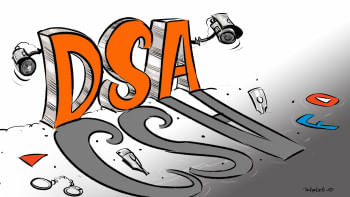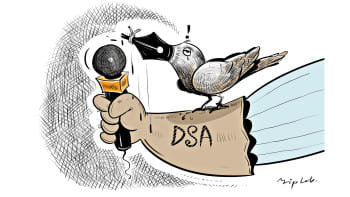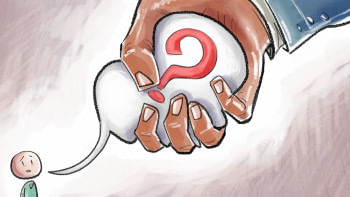The media must do more to protest oppressive laws like the CSA

The timing of the Cyber Security Act, in the run-up to the elections, was hardly surprising. Oddly enough, it fits a strange pattern that goes back 20 years. Before delving into a discussion around this new menace against press freedom, let us explore this pattern.
The Bangladesh Telecommunication Regulation Act, 2001 intended to control the communications infrastructure, providing sweeping powers to the government. This law allowed the government to tap any phone or track its location for as long as it wanted, based on its suspicions. The law was enacted a few months before a national election.
When the outgoing BNP regime enacted the ICT act in 2006, as one of its last acts in office, it was most likely to provide what it hoped would be a puppet caretaker government with an instrument to apprehend undesirable elements. For all intents and purposes, at least as far as BNP was concerned, the election was all but won with a malleable president duly installed to head the caretaker government. That government fell apart, some would say specifically because the president was overly malleable.
The ICT act set a precedent of seeking to control online content and criminalise free expression of thoughts. Its rather nebulous Section 57 strived to define an offence but left much to interpretation, basically allowing the government to criminalise online content at its discretion.
The following Awami League government amended that act in 2013, in the run-up to the 2014 election, and turned it into an even more potent weapon to clamp down on dissent. The amendment allowed the government to make arrests without warrant and made cases under certain sections, including Section 57, non-bailable. In the aftermath, Section 57 gained much notoriety and went on to inspire a level of fear that could only be compared to that of the infamous Section 144 from the Pakistan (Language Movement?) period.
The ICT Act was retired to be replaced by the more potent Digital Security Act. Very similar to BNP's ICT Act, the DSA was passed during the last days of the Awami League government in office in 2018, just before the election and without much discussion in parliament or outside. The DSA allowed arrests without a warrant solely on the basis of suspicion. Evidently intent on criminalising expression and controlling online content, or rather dissent, the DSA's widespread use saw much criticism within the media.
More recently, and yet again leading up to another general election, the Cyber Security Act is set to replace the DSA with nominal concessions, essentially remaining the same beast as its predecessor but with the added potential to be used against whistleblowers.
The consistent pattern of introducing these laws in the run-up to elections suggests that this phenomenon is not merely coincidental. It also suggests that successive regimes have enacted such laws at a critical juncture, most likely to be able to use them, or abuse them, over the impending uncertainty that elections bring about.
However, another pattern, or the lack thereof, emerges from a cursory perusal of periodicals and newspapers. Editors and journalists have held meetings and discussions every time these laws were passed. Citizens, civil society groups, and activists have held rallies and demonstrations against these acts of legislation. These laws are often the centre of discussion when a certain extreme instance of abuse comes to light and duly makes it to the headlines over several days. But there has not been any sustained campaign from any single outlet on this issue. None of the outlets in Bangladesh has consistently covered any of these laws for even a week. In short, for all its talk and posturing, the media has hardly campaigned against these laws.
As any seasoned campaigner would agree, it takes weeks, months, and sometimes years of relentless harping of these issues to generate a critical mass that impels authorities towards remedial action. That has been all but absent in popular news media. It may well be that, considering the current climate of iron-handed intolerance, such coverage would bring down further wrath from the powers that be. But there are smarter ways of circumventing this, too. News outlets need not publish critical stories or about the injustices derived from these laws.
In these difficult times, when trust and confidence in news outlets are ebbing, not least due to laws of the state, it is no longer enough to just cover the news and hope that readers will be happy.
Short of a designated CSA or DSA corner on the website or the printed newspaper, one could simply introduce a "seal" for news items that have been impacted or affected by the law in question. A simple "CSA seal" on top of every report would suffice. Every report that refrains from divulging the full details of a story to keep from being sued under the provisions of this law would carry this seal. This would serve two purposes. First, it would keep this issue alive and readers would be reminded that the news industry lives under the spectre of a law that threatens and criminalises free speech. It would keep the campaign alive for months, if not years. It would also put on record the number of stories that are affected by the law. Second, a "CSA seal" would indicate to the reader that the news outlet in question is admitting to its readers that it is not being able to be fully transparent, so far as a particular story is concerned. As opposed to a seal of quality, this seal would indicate the contrary: that the story is not complete, thus increasing the story's credibility among readers.
Another measure could be a public editor speaking on behalf of the people at regular intervals. This public editor, employed by the news outlet but independent of the outlet's editorial oversight, would look out for the interests of the readers and write on the shortcomings of that news outlet – such as partial stories for fear of reprisals due to laws that criminalise free speech. The public editor could be the news outlet's own mechanism to hold itself to account on behalf of the public. The recent fiasco over disinformation through pro-government op-ed's begs a candid confession from news outlets, which has not been forthcoming. This is the kind of thing that the public editor would presumably take up and comment on.
In these difficult times, when trust and confidence in news outlets are ebbing, not least due to laws of the state, it is no longer enough to just cover the news and hope that readers will be happy. Readers are already flocking to independent analysts and commentators who spew all kinds of vitriol. It used to be that initial interest in such commentary would wane and readers would flock back to traditional journalistic platforms. It used to be that the alternatives would be clear: one being a source of authentic, meaningful, and balanced reporting and another offering a skewed point-of-view. But this is not possible anymore, thanks to the climate of self-censorship and fear. Hence, readers do not have the benefit of a convincingly better alternative. It is becoming increasingly imperative for legacy outlets to find avenues to tell readers that they are being as responsible and truthful as possible. It is imperative that news outlets subject themselves to ever stronger, more exacting standards of journalism in order to remain credible.
Tanim Ahmed is a freelance journalist based in Dhaka.
Views expressed in this article are the author's own.
Follow The Daily Star Opinion on Facebook for the latest opinions, commentaries and analyses by experts and professionals. To contribute your article or letter to The Daily Star Opinion, see our guidelines for submission.

 For all latest news, follow The Daily Star's Google News channel.
For all latest news, follow The Daily Star's Google News channel. 












Comments